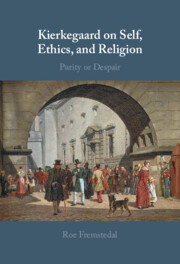Book contents
- Kierkegaard on Self, Ethics, and Religion
- Kierkegaard on Self, Ethics, and Religion
- Copyright page
- Dedication
- Contents
- Figures and Tables
- Acknowledgments
- Abbreviations
- Introduction
- Part I Self, Despair, and Wholeheartedness
- Part II Morality, Prudence, and Religion
- Part III “Subjectivity, Inwardness, Is Truth”
- Part IV Faith and Reason
- Chapter 10 A Leap of Faith? The Use of Lessing, Jacobi, and Kant
- Chapter 11 Faith Neither Absurd Nor Irrational: The Neglected Reply to Eiríksson
- Chapter 12 Faith Beyond Reason: Suprarationalism and Antirationalism
- Chapter 13 The Ethics of Belief: Fideism and Pragmatism
- Conclusion
- References
- Index
Conclusion
from Part IV - Faith and Reason
Published online by Cambridge University Press: 27 January 2022
- Kierkegaard on Self, Ethics, and Religion
- Kierkegaard on Self, Ethics, and Religion
- Copyright page
- Dedication
- Contents
- Figures and Tables
- Acknowledgments
- Abbreviations
- Introduction
- Part I Self, Despair, and Wholeheartedness
- Part II Morality, Prudence, and Religion
- Part III “Subjectivity, Inwardness, Is Truth”
- Part IV Faith and Reason
- Chapter 10 A Leap of Faith? The Use of Lessing, Jacobi, and Kant
- Chapter 11 Faith Neither Absurd Nor Irrational: The Neglected Reply to Eiríksson
- Chapter 12 Faith Beyond Reason: Suprarationalism and Antirationalism
- Chapter 13 The Ethics of Belief: Fideism and Pragmatism
- Conclusion
- References
- Index
Summary
The conclusion of the book summarizes its main findings and points to remaining issues that need more work. It argues that a coherent or unified self cannot remove (motivational and normative) tension between morality and prudence, or even tension between Christian revelation and natural standards. Clearly, Kierkegaard is not a monist concerning value or normativity, who thinks that only one thing matters. Full moral commitment, notably, does not rule out other concerns, norms, or reasons. For morality not only allows self-interest but it even seems to presuppose it, since we could not chose morality only for its own sake unless it differed from prudence. And Christian revelation, on the other hand, builds on and reinterprets pre-Christian, natural standards. Therefore, the tension between different standards remains. But this does not mean that Kierkegaard is a pluralist (or relativist) who denies unity or coherence concerning selfhood. Rather, he is a pluramonist who combines plurality with unity and coherence.
- Type
- Chapter
- Information
- Kierkegaard on Self, Ethics, and ReligionPurity or Despair, pp. 251 - 255Publisher: Cambridge University PressPrint publication year: 2022

